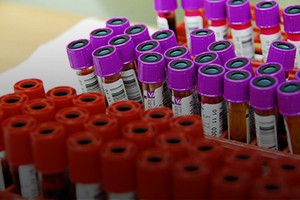Making Universal Blood

The discovery of enzymes from bacteria in the human gut could someday make blood shortages a thing of the past by turning different types of blood into Type O – the blood type that is universally accepted for transfusion.
Blood is typed into four main varieties (A, B, AB and O) based on different sugars carried on the surface of the cells. Type A blood carries N-acetylgalactosamine; Type B carries galactose; and Type AB has a mix of both. These sugars act like antigens to trigger an immune response when transfused into a person with a different blood type, and the reaction can be fatal. Type O blood, on the other hand, contains none of these sugar residues, making it safe for any recipient.
While researchers have been working since the 1980s on ways to strip antigens from blood cells, the processes have been inefficient, requiring impractically large amounts of enzymes to fully strip away the sugars. The new research focused on bacteria that are known to harvest these same sugars in the gut. In analyzing the bacterial genes, a family of enzymes was discovered that, when mixed with Type A blood, removed the sugars to produce Type O blood 30 times more efficiently than any existing method.
Additional safety testing is needed to confirm the complete removal of antigens and expand the research to include Type B blood as well as all of the possible subtypes of AB blood. But researchers are optimistic that the approach will be effective.
For information: Stephen Withers, University of British Columbia, Department of Chemistry, Vancouver Campus, 2036 Main Mall, Vancouver, British Columbia, Canada V6T 1Z1; phone: 604-822-3266; Fax: 604-822-2847; email: withers@cham.ubc.ca; Web site: https://www.ubc.ca/